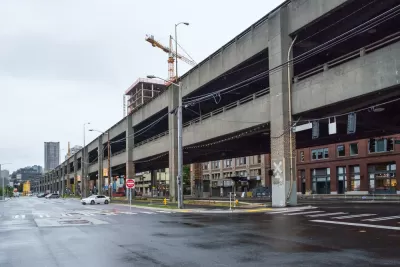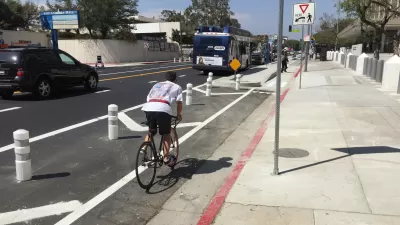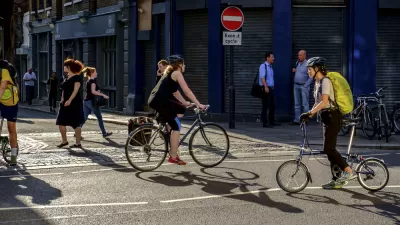Dubbed the "Seattle Squeeze," heavier traffic is expected in the new year as the Alaskan Way Viaduct closes and downtown construction projects continue. While the city prepares, activists want to use the opportunity to encourage other modes.

"On Jan. 11, 2019," Josh Cohen writes, "the Highway 99 Viaduct will close, three weeks before its replacement tunnel opens. With the Viaduct's more than 90,000 daily drivers spilling onto other streets and highways, January is sure to be a mess." On top of that, major construction projects will continue to impact traffic conditions until 2024, a period some are calling the "Seattle Squeeze."
During the Viaduct closure and beyond, the city is "desperate to get fewer people to drive solo." But as the city focuses most of its attention on mitigating the Squeeze's immediate effects, activists want to use the moment to change how Seattleites get around in a lasting way. They include Move All Seattle Sustainably (MASS), an advocacy group that has released a list of priorities for the city during the crunch.
Activists are focused on ways to improve bus service, build out bike lanes, and make it easier for commuters to walk to work. Making progress on those fronts, they argue, will make the city's long-term transportation goals more feasible as people contemplate getting out of their cars. Those goals include congestion pricing, "the centerpiece of [Mayor] Durkan's long term strategy." If implemented, Seattle would be the first U.S. city with such a policy.
FULL STORY: As Seattle’s traffic doom looms, some see a silver lining

Planetizen Federal Action Tracker
A weekly monitor of how Trump’s orders and actions are impacting planners and planning in America.

Congressman Proposes Bill to Rename DC Metro “Trump Train”
The Make Autorail Great Again Act would withhold federal funding to the system until the Washington Metropolitan Area Transit Authority (WMATA), rebrands as the Washington Metropolitan Authority for Greater Access (WMAGA).

The Simple Legislative Tool Transforming Vacant Downtowns
In California, Michigan and Georgia, an easy win is bringing dollars — and delight — back to city centers.

The States Losing Rural Delivery Rooms at an Alarming Pace
In some states, as few as 9% of rural hospitals still deliver babies. As a result, rising pre-term births, no adequate pre-term care and "harrowing" close calls are a growing reality.

The Small South Asian Republic Going all in on EVs
Thanks to one simple policy change less than five years ago, 65% of new cars in this Himalayan country are now electric.

DC Backpedals on Bike Lane Protection, Swaps Barriers for Paint
Citing aesthetic concerns, the city is removing the concrete barriers and flexposts that once separated Arizona Avenue cyclists from motor vehicles.
Urban Design for Planners 1: Software Tools
This six-course series explores essential urban design concepts using open source software and equips planners with the tools they need to participate fully in the urban design process.
Planning for Universal Design
Learn the tools for implementing Universal Design in planning regulations.
Smith Gee Studio
City of Charlotte
City of Camden Redevelopment Agency
City of Astoria
Transportation Research & Education Center (TREC) at Portland State University
US High Speed Rail Association
City of Camden Redevelopment Agency
Municipality of Princeton (NJ)





























